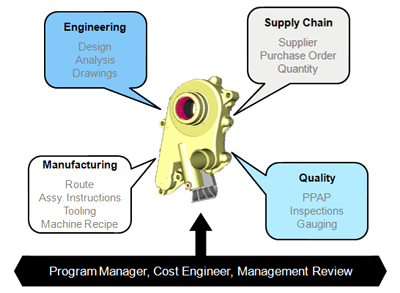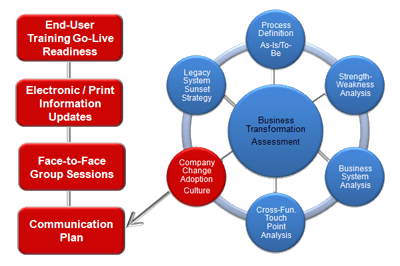Business Transformation Assessment
Questions like ‘Where do we begin?’, ‘How do we start?’, and ‘Which technology should we evaluate first?” are common from project teams tasked by executives with improving their business environment.
Years ago Mercury Marine management tasked us with a similar challenge, and we used several approaches and tools to objectively evaluate the business environment and gain executive alignment before forging ahead with technology.
By performing an internal assessment, Mercury Marine was positioned to make the most of its business transformation. The company understood the ‘as-is’ and mapped the ‘to-be’ independent of software.
The business also understood its strengths and weaknesses, the culture and its willingness to change, as well as its business system landscape, application and cross-functional touch points, and the sunset strategy for legacy tools.
Let our team help establish a foundation for success within your business too.

PLM Vision & Strategy
It is critical to devise a PLM strategy that establishes an end-state ‘vision’ prior to evaluating technology.
PLM strategy consist of understanding high-level concepts like a unified bill of material that uses different ‘views’ for engineering, manufacturing, and service, as well as how to associate item-related datasets to the master item data, downstream data reuse, and business rules that enforce PLM data integrity.
From our experience, the key to a successful PLM deployment is for the organization to define a PLM ‘vision’ and document the critical steps necessary to get there.
We can help create a ‘connectedness’ roadmap after understanding your business drivers, future growth goals, and process needs.
A ‘connectedness’ roadmap provides all levels of the organization with a visual understanding of the necessary pieces and the sequence required to build the PLM system to deliver short-term wins while keeping the long-term vision in mind.

Site Assessment

For many organizations, the first step toward a PLM implementation is understanding how their current product development processes and systems fare compared to industry standards.
Because we operate within a dynamic, global product development environment that supports a world-wide manufacturing footprint, we have made many of the tough, strategic decisions that helped set our PLM initiative on the right course. A part of our role is to pass along wisdom gained from experience to optimize client PLM initiatives and help push their end state ‘vision’ further and faster than without the correct guidance.
Benchmarking
Mercury Digital Services offers a unique and valuable perspective to organizations that are considering a PLM implementation. Prior to investing in a PLM deployment at Mercury Marine, more than 100 companies benchmarked Mercury’s process-centric approach, industry-tested solutions, and established thought leadership.
Benchmarking allows manufacturers to harness data from both new and legacy assets for smarter decisions and smarter investments. Mercury Digital Services understands the value of comparing business processes and performance metrics to industry bests and best practices from other companies to achieve more reliable data, making smarter, faster decisions, and leveraging data-backed investments.

Requirements & Process Analysis

Business transformations often fail because of because of legacy culture. Not necessarily due to the technical solution, but because key stakeholders or constituencies were not kept ‘in the loop’.
Our team has learned from many global system deployments and can provide proven approaches to communicating system or process change to reduce the impact for the organization.
We can assist your team with change communication planning or creating presentations and facilitating group sessions to help ensure a successful PLM implementation.